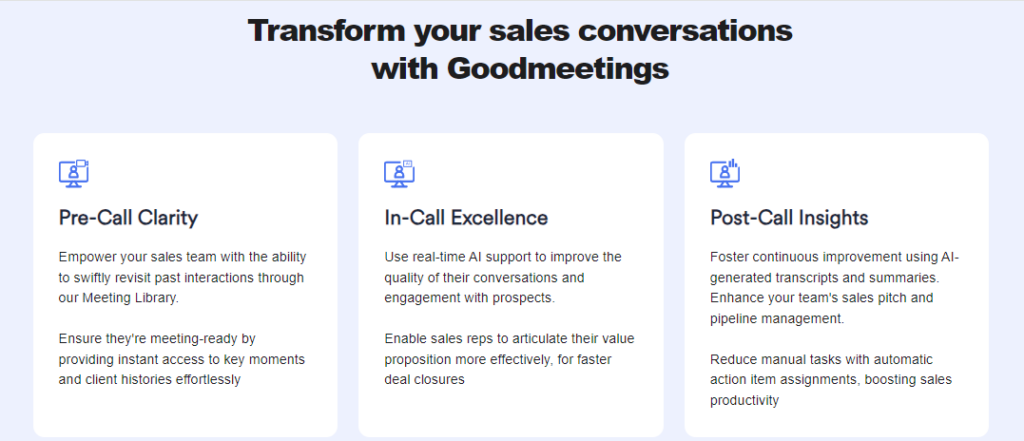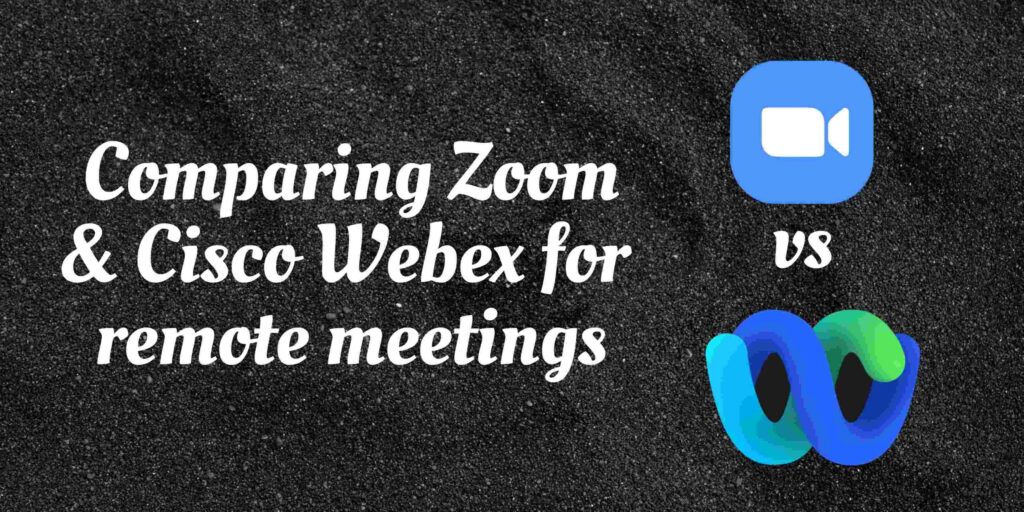Sales is all about communication!
Why? Studies show that salespeople speak for 81% of the time during sales situations.
From building initial rapport to overcoming objections and closing deals, effective communication plays a crucial role throughout the entire process. Without it, even the most promising leads may slip away.
Imagine this scenario: You possess an outstanding product or service designed to solve your customer’s needs. However, if you cannot effectively communicate its benefits and address their concerns, you’re at a significant disadvantage.
That’s why mastering the art of sales communication is essential. By sharpening listening, persuasion, and empathy skills, your sales team will win more deals and create long-term relationships with your customers.
So, in this article, we’ll discuss the 10 critical sales communication skills that will turn your sales team into deal-closing experts.
What is Sales Communication?

Source: Goodmeetings
Sales communication refers to the exchange of information between sales professionals and potential customers to promote products or services.
It involves effectively conveying the value proposition, addressing customer concerns, and building rapport to ultimately persuade the customer to make a purchase.
This communication can occur through various channels such as face-to-face meetings, phone calls, emails, or online interactions. Sales communication relies on clear, concise language and active listening to understand customer needs and tailor responses accordingly.
Here’s an example of effective use of communication skills in sales:
Imagine you’re a salesperson pitching a new CRM software to a potential client.
- You listen to their challenges with tracking customer interactions and managing leads.
- Using clear and persuasive communication, you explain how your software streamlines these processes, saving time and improving productivity.
- You address their concerns about integration and training, providing reassurance and offering a demo.
By the end of the conversation, the client is eager to learn more and considers moving forward with your solution.
You can harness the power of AI to improve your sales communication skills with Goodmeetings. Close deals faster and build lasting relations with AI insights and assistance.
Related: 11 Effective Ways To Improve Sales Conversations & Drive More Revenue
Importance of Communication Skills in Sales
Whether you’re selling a product, a service, or an idea, the success of your sales efforts depends on effective communication. It serves as the bridge that connects you to your prospects, allowing you to build trust, and ultimately, close deals.
Let’s see why sales communication skills matter:
1. Building Relationships
Effective sales communication skills help in establishing trust and rapport with potential customers, laying the foundation for long-term relationships.
2. Understanding Customer Needs
Through active listening and probing, sales communication allows salespeople to grasp the specific requirements and pain points of customers, enabling tailored solutions.
3. Conveying Value Proposition
Clear and compelling communication skills for sales articulates the unique benefits and value of products or services, highlighting why they are the best choice for the customer.
4. Handling Objections
Strong sales communication skills empower salespeople to address objections confidently and persuasively, turning concerns into opportunities to reinforce value.
5. Closing Deals
The ability to communicate persuasively and negotiate effectively plays a pivotal role in convincing prospects to make a purchasing decision.
6. Providing Excellent Customer Service
Continuous communication post-sale ensures customer satisfaction, encourages loyalty, and opens avenues for upselling or cross-selling opportunities.
7. Adapting to Different Audiences
Versatile sales communication skills enable salespeople to adjust their approach based on the preferences, personality, and communication style of each prospect.
8. Facilitating Team Collaboration
Effective communication within the sales team promotes collaboration, ensures alignment on goals and strategies, and fosters a cohesive working environment.
9. Driving Business Growth
Ultimately, strong sales communication skills across the sales pipeline contribute to increased revenue, customer satisfaction, and overall business success.
Related: Mastering Sales Demos: The Ultimate Guide to Winning & Closing More Deals
10 Crucial Sales Communication Skills
Here are 10 essential sales communication skills for sales reps. These skills can empower your team to excel in closing deals and building lasting client relationships.

Source: Goodmeetings
1. Active Listening
Active listening is one of the most important sales communication skills. It involves fully engaging with customers by giving them your undivided attention, processing their words, and responding appropriately.
Why it is important:
Active listening is crucial because it demonstrates to customers that their concerns are being heard and valued. It allows you to understand their needs more accurately, which in turn helps you tailor your solutions to meet those needs effectively.
Active listening can enhance sales performance by up to 8%.
How to use it:
- Maintain eye contact
- Nod or provide verbal affirmations to show you’re listening
- Paraphrase or summarize what the customer says to ensure understanding
- Avoid interrupting or thinking about your response while the customer is speaking.
2. Empathy
Empathy involves understanding and sharing the feelings of others, in this case, the customers. It’s about acknowledging their emotions and demonstrating compassion.
Why it is important:
Empathy creates a connection with customers on a deeper level, showing them that you genuinely care about their concerns. It helps to build trust and rapport, making customers more likely to open up and engage in the sales process.
Around 45% of consumers indicate they will buy more from a company that demonstrates empathy.
How to use it:
- Recognize and validate the customer’s feelings and concerns.
- Show empathy and understanding by expressing concern for their situation.
- Use phrases like “I understand how you feel” or “That sounds frustrating” to convey empathy.
- Refrain from disregarding or downplaying the customer’s emotions.
Related: ChatGPT for Sales: 10 Ways to Boost Your Sales Revenue Using ChatGPT
3. Read Body Language
Reading body language involves observing and interpreting nonverbal cues such as facial expressions, gestures, posture, and eye contact to understand the customer’s feelings and reactions.
Why it is important:
Body language often communicates more than words alone, providing valuable insights into a customer’s level of interest, engagement, or discomfort. Understanding these cues allows sales professionals to adjust their approach accordingly and build rapport more effectively.
Experts suggest that as much as 93% of communication occurs through non-verbal cues, emphasizing the importance of refining your non-verbal communication skills.
How to use it:
- Pay attention to the customer’s facial expressions, posture, gestures, and eye contact.
- Look for signs of interest, agreement, confusion, or hesitation.
- Adapt your communication style based on the cues you observe.
4. Adjust Voice Tone
Adjusting voice tone involves modulating the pitch, volume, and pace of your speech to match the situation and the customer’s mood.
Gong’s conversation intelligence found that successful salespeople typically prompt customers to change their speaking pace by an average of 13% within the initial three minutes of a call.
Why it is important:
Voice tone conveys emotion and intention, influencing how your message is perceived by the customer. Matching your tone to the customer’s mood helps establish rapport and fosters a sense of connection.
How to use it:
- Pay attention to the customer’s tone of voice and overall demeanor.
- If the customer sounds enthusiastic, mirror their energy with an upbeat tone.
- For reserved or serious customers, adopt a calm and respectful tone.
- Avoid speaking too quickly or loudly, aiming for a moderate pace and volume comfortable for the customer.
Related: 4 Ways To Measure and Improve Sales Effectiveness
5. Clarity and Conciseness
Clarity and conciseness involve communicating ideas and information in a clear, straightforward manner without unnecessary complexity or verbosity. It is one of the most important sales and communication skills.
Research indicates that right after hearing a 10-minute spoken presentation, the typical listener has grasped and remembered about half of the information shared.
So, it is important to be clear and concise when speaking to prospects.
Why it is important:
Clear and concise communication minimizes the risk of misunderstanding or confusion, ensuring that your message is easily understood by the customer. It helps maintain their attention and engagement, preventing information overload and enhancing retention.
How to use it:
- Communicate in straightforward terms that are easy to understand.
- Minimize the use of technical terms unless necessary for clarity.
- Simplify complicated concepts into smaller, more digestible pieces.
- Be mindful of the customer’s level of understanding and adjust communication accordingly.
- Offer additional explanation or clarification as needed to ensure comprehension.
6. Persuasive Speaking
Persuasive speaking involves presenting arguments and benefits in a compelling manner to convince customers to take action or make a decision in your favor.
Why it is important:
Persuasive speaking is essential for overcoming objections, addressing doubts, and ultimately persuading customers to buy your product or service. It helps build credibility, instill confidence, and motivate customers to act.
How to use it:
- Employ language that is convincing and compelling.
- Use storytelling, testimonials, and evidence-based reasoning to support claims.
- Emphasize the distinctive advantages of your product or service.
- Illustrate how your offering addresses customer needs or issues.
- Gently steer the customer towards a positive purchasing choice.
Related: 6 Proven Ways To Close More Deals
7. Questioning Techniques
Questioning techniques involve using strategic and effective questions to gather information, uncover needs, and deepen understanding during sales conversations.
Why it is important:
Effective questioning allows sales professionals to gather valuable insights into the customer’s situation, preferences, and pain points. It helps build rapport, demonstrate interest, and tailor solutions to meet the customer’s specific needs effectively.
How to use it:
- Ask open-ended questions that prompt detailed responses.
- Delve deeper into specific topics or clarify unclear points with targeted inquiries.
- Pay close attention to the customer’s responses, demonstrating engagement and interest.
- Pose additional questions to explore further or confirm comprehension..
- Build trust and connection by engaging in meaningful dialogue.
8. Adaptability
Adaptability refers to the ability to adjust your communication style, approach, and strategies to suit different customers and situations effectively.
Why it is important
Adaptability is crucial for building rapport, building trust, and maximizing success in sales interactions. It allows sales professionals to connect with customers on their terms, catering to their preferences, personality, and communication style.
How to use it:
- Pay attention to the customer’s tone, body language, and engagement level.
- Match the customer’s energy, pace, and tone to enhance connection.
- Be open to adjusting your approach based on changes in the conversation or unforeseen obstacles.
- Address challenges promptly and pivot as necessary to preserve rapport and meet goals.
Related: Sales Productivity Formula – How to Calculate with Examples
9. Subject Matter Expertise
Subject matter expertise refers to possessing deep knowledge and understanding of the products or services being sold, as well as relevant industry trends, best practices, and competitive landscape.
Why it is important:
Before engaging with a human sales representative, 96% of prospects conduct their own research.
Subject matter expertise builds credibility, instills confidence, and enhances trust with customers. It allows sales professionals to answer inquiries confidently, address objections effectively, and provide valuable insights and recommendations based on their expertise.
How to use it:
- Maintain a thorough understanding of your products/services, including updates, features, and benefits.
- Stay informed about industry trends, market developments, and competitor offerings.
- Provide informed and relevant advice to customers based on your knowledge of products/services and industry insights.
- Be prepared to confidently answer questions and address concerns using your expertise.
- Offer value-added solutions and recommendations that demonstrate your understanding and expertise.
10. Written Communication
Written communication involves conveying information through written words, such as emails, reports, or proposals.
Why it is important:
On average, written communication retains about 78% of the information.
Written communication is essential for providing detailed information, documenting agreements, and following up on conversations. It allows sales professionals to communicate effectively with customers, colleagues, and other stakeholders, regardless of time or location.
How to use it:
- Use clear and concise language to ensure your message is easily understood.
- information logically and structurally to enhance readability.
- Proofread your written communication for errors or ambiguities before sending.
- Tailor your written communication to the recipient’s preferences and needs.
- Maintain a professional tone and formatting to convey credibility and professionalism.
- Respond promptly to written communication to demonstrate attentiveness and commitment to customer service.
Related: 20 Sales Productivity Tools To Boost Your Sales in 2024
How Can You Measure the Communication Skills of Sales Representatives?
Here are some methods you can use to measure the sales communication skills of your team:
1. Role-playing Exercises
Conduct role-playing scenarios where sales representatives interact with simulated customers. Evaluate their ability to listen actively, ask relevant questions, and convey information effectively.
2. Customer Feedback Surveys
Collect feedback from customers regarding their interactions with sales representatives. Assess responses related to clarity of communication, responsiveness, and overall satisfaction.
3. Call Monitoring
Listen to recorded sales calls or observe live interactions to evaluate communication skills in real time. Assess factors such as tone of voice, rapport-building, and handling of objections. You can use Goodmeetings to easily record and monitor sales calls.
4. Performance Metrics
Analyze performance metrics such as conversion rates, average deal size, and customer retention. With Goodmeetings, you can easily check meeting performance insights.
5. Skill Assessments
Administer written or online assessments to evaluate sales representatives’ understanding of communication techniques, objection handling, and product knowledge.
5. Peer Evaluations
Encourage peer feedback where colleagues provide insights on each other’s sales communication skills. This can offer valuable perspectives from those working closely with the representatives.
Related: 10 B2B Sales Prospecting Tools in the Market
Use AI to Improve Sales Team Communication
Are you wondering how to build communication skills in sales? AI tools can help!
Artificial intelligence plays an important role in sales communication skills by,
- Automating tasks
- Analyzing data for personalized interactions
- Enhancing efficiency and effectiveness across various channels
One such AI tool that you can use to improve sales communication is Goodmeetings. This platform helps to automatically record, transcribe and summarize all your meetings and sales conversations in one place.
The tool will help you review all interactions, provide valuable insights and coach the sales team to improve their communication skills. It speeds up the process of sales communication skills training.

Source: Goodmeetings
Key Features of Goodmeetings
- Record and Review: Goodmeetings records and transcribes customer interactions, providing valuable insights for improving communication.
- Analytics Insights: Gain valuable insights into meeting performance and customer sentiment using Goodmeetings’ advanced analytics tools.
- AI Coaching: Get real-time feedback during meetings for effective sales communication skills training,
- Highlight Important Moments: Goodmeetings automatically highlights crucial moments in meetings, helping reps focus on key aspects of the conversation.
- AI-generated Battlecards: Equip reps with valuable talking points and strategies for effective communication.
- Collaborative Platform: Facilitate team collaboration by sharing meeting insights and best practices in real time.
- Sentiment Analysis: Understand customer sentiment to adjust communication style and approach accordingly.
- Language Translation: Communicate seamlessly with customers worldwide using Goodmeetings’ AI-driven language translation features.
How Goodmeetings Improve Sales Team Communication?

Source: Goodmeetings
1. Pre-Call Clarity: Goodmeetings lets you quickly look back at past meetings so you’re ready with all the info you need for your next conversation.
2. In-Call Excellence: With Goodmeetings, you get real-time help from AI to make your conversations better, helping you explain your product or service in a way that closes deals faster.
3. Post-Call Insights: Goodmeetings automatically gives you transcripts and summaries of your calls. It even helps you organize what you need to do next, so you can focus on selling more effectively.
Related: Getting Started with the Goodmeetings Notetaker
With Goodmeetings in your AI toolkit, you can equip your sales team with all the necessary resources to communicate with clients more effectively.
The best part is that you can use this tool for free with a 7-day trial offer. Sign up or book a demo to see how it streamlines your sales communication.
Wrapping Up
Mastering these 10 critical sales communication skills is key to success in sales. By improving these abilities, your team can build stronger relationships, handle objections, and close deals better. Goodmeetings can help you apply these skills effectively, ensuring your team achieves remarkable success in sales.
GET IN TOUCH





